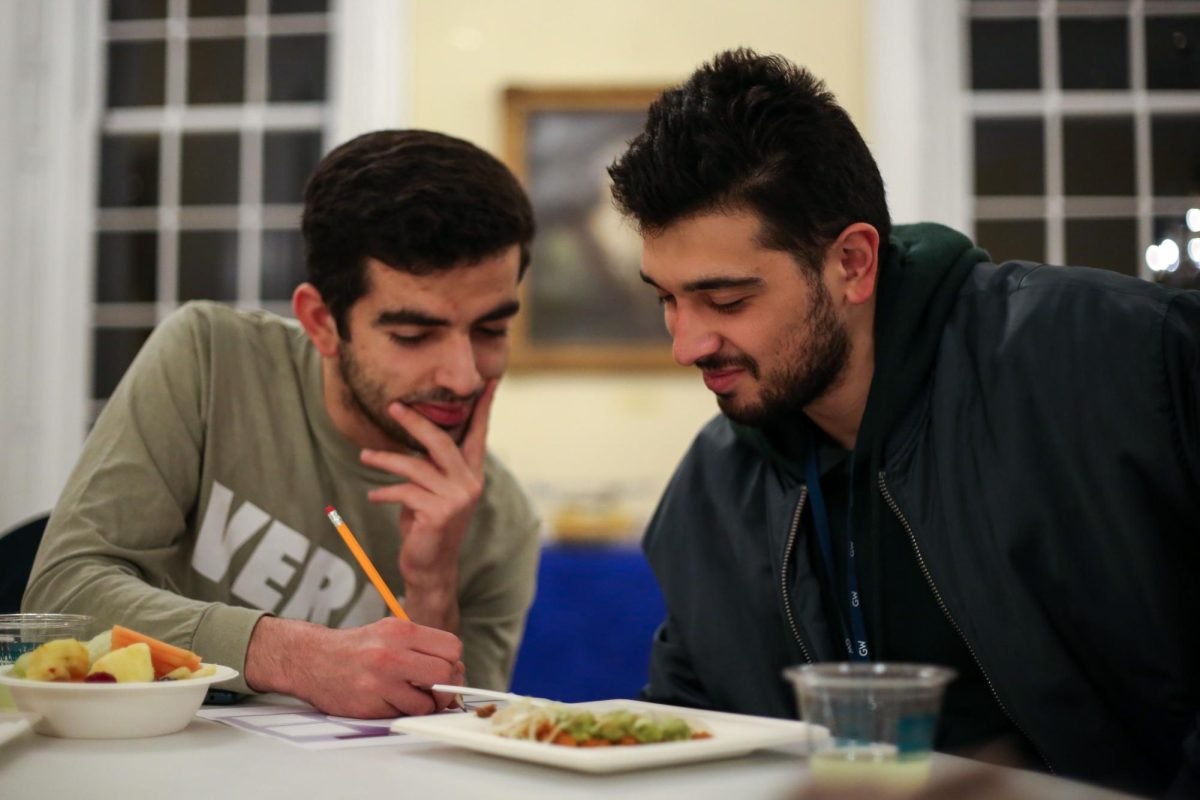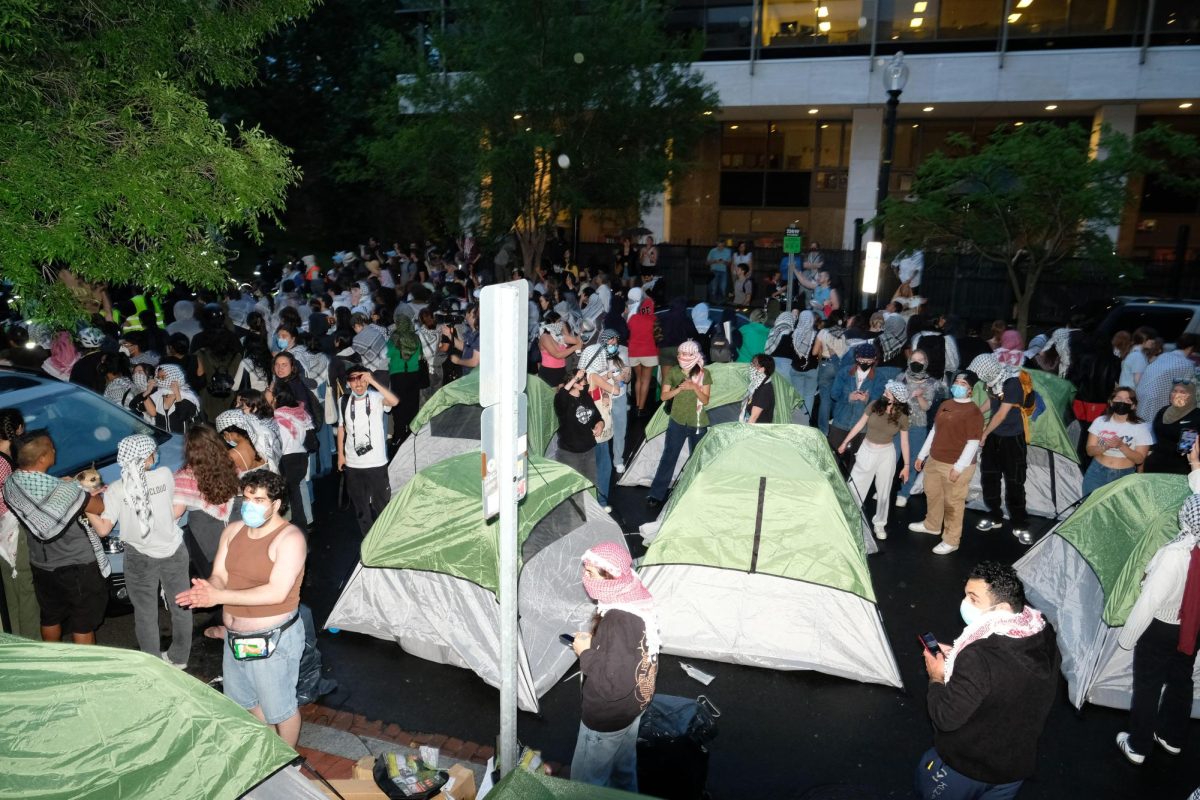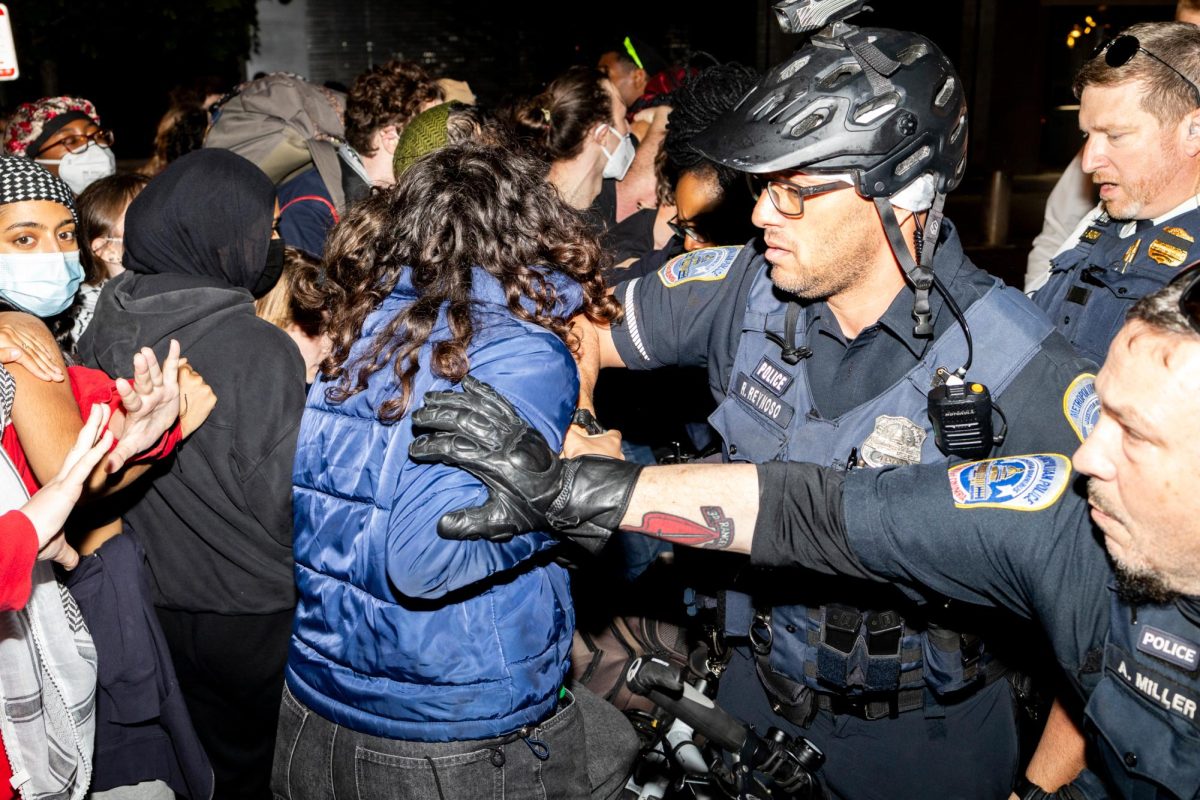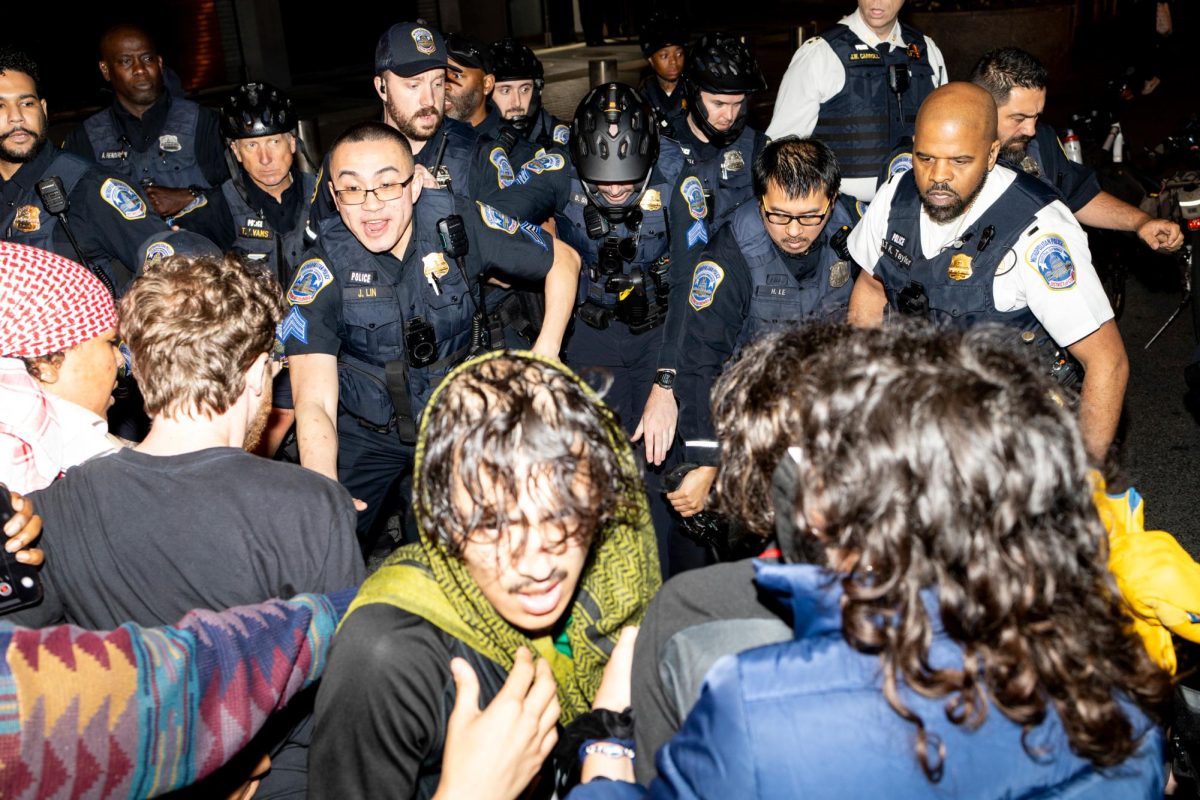Amid inflamed tensions between community members from the ongoing war in Gaza, students and officials are unsure how to piece GW’s community back together.
In the months following the outbreak of the war, students have collectively mourned on campus for loved ones they lost in Israel and Gaza. In the process, officials condemned a pro-Palestinian vigil, suspended Students for Justice in Palestine amid nationwide outcry and allegedly placed organizations allied with SJP through student conduct proceedings.
In an effort to assuage a campus rife with polarization in January, the University hosted a series of conversations about conflict resolution and free speech, a part of officials’ plan to cultivate “productive” dialogue in the wake of on-campus tensions due to the war in Gaza.
Student organizations have also launched student-led conversations to facilitate civil dialogue around the ongoing war and the Israeli-Palestinian conflict to bring together students with differing perspectives.
Despite the opportunities for students to engage in these conversations, many don’t seem to want to. Students and officials said conversations at the discussion events have been civil and productive but would benefit from higher turnout. Many of the discussions have been sparsely attended, with few high-attendance exceptions among the more than a dozen events.
“Community means we won’t always agree,” Dean of Students Colette Coleman said. “I can still hear your viewpoint and not agree with you, but I don’t have to be rude to you and I don’t have to dismiss you and I don’t have to try to take you out like there’s just ways to move through society differently.”
Coleman said Oct. 7 exposed pre-existing divisions within the community, with differing ideologies and the fear of being “canceled” causing friend groups on campus to splinter.
Coleman said she understands that not all students on campus are “happy” with her — posters on campus and chants at student protests have expressed discontent with officials, and many have named Coleman. She said people cannot be defined by one statement, and that her role is not to please everyone or make political statements, but to try to support students in pain.
“I would rather make a statement about, you know, our humanity, than about the politics, right?” Coleman said.
She said officials developed conversation series like Dinner and Dialogue after noticing students were afraid to express their viewpoints for fear of losing friends after the war’s outbreak. She said officials did not develop the conversation series expecting throngs of people to attend, with the highest attendance for a session capping off at 18 students, but that healthy dialogue works best in smaller groups.
“We wanted to hold space and create space, where students could come together to explore like, ‘Maybe I’m just here to listen,’” Coleman said. “‘Maybe it will give me a different perspective for how to approach this conversation with someone that I thought was a friend and now I’m not so sure and I don’t know how to move this back to where I thought we were.’”
Other universities have created similar dialogue series after increased student tension on their campuses.
Coleman said meaningful dialogue between students starts with empathy and compassion for everyone impacted. Officials plan to continue hosting conversation series and trying to figure out how to facilitate productive conversations among them, she said.
“We have to create opportunities to help our students be in those moments where they can have hard conversations and they can advocate for, guess what, things that are on completely opposite sides of each other and still be okay together,” Coleman said.
Some student groups like the Student Coalition for Palestine at GW — a group of pro-Palestinian student organizations that formed following SJP’s suspension — have ridiculed GW for their attempts to mend civil dialogue on campus, calling the first Dinner and Dialogue session as “[coercive] and conditional.” The group has also hosted three closed-door teach-ins since the end of January about the conflicts happening in Palestine, Congo and Sudan. The coalition did not return a request for comment about the educational sessions.
“Classes will lecture about decolonization and apartheid and encourage us to think critically about such events in history within our discussion, but the University puts us at risk when we directly combat this,” a student speaker said at a coalition protest in December. “They ironically rebrand us as revolutionaries and host Diversity Summits calling for justice, liberation and empathy, yet these are the very practices they suppress on our campus.”
GW for Israel has held conversations with an Israel Defense Forces reservist, a Palestinian commentator on the conflict and a senior analyst for the Times of Israel. GWI did not return a request for comment.
In January, GW Hillel sponsored a discussion club formed by three students who saw a need for a student-led space to discuss the ongoing war in Gaza, and the leaders said the discussions have so far gathered 10 to 20 students. Sophomore Geena Seflin, one of the founders of GW Discussion Club in D.C., said one of the main goals of the group is to create an environment where individuals can feel and share more than one truth, like supporting Israeli and Palestinian peoples’ right to exist.
“There’s a lot of times I’ve seen on campus, only one of those two things can be true, not both of them,” Seflin said. “And I feel like in this organization, we have really worked to make two truths out of one concept.”
Sophomore Celia Little, the president of J Street U at GW — an organization representing students for a two-state solution — said GW’s “political” student body amplifies polarization on campus, which has inhibited productive dialogue. She added that students are afraid to speak out when they don’t feel informed about the topic.
She said some students do not want to hear the other side out because many Jewish and Palestinian students have personal connections to people affected by the war.
“To me, a lack of dialogue makes sense because it’s such an emotional topic, and it’s so rooted in trauma,” Little said.
Junior Jacoby Sypher, the president of BridgeGW, a multipartisan student organization aiming to reduce campus polarization, said the group waited to host their first discussion on the conflict until last week because he noticed an unwillingness to engage in productive dialogue among students directly following Oct. 7. He said the discussion included about 40 students and served to facilitate talks between students on campus through a “neutral third party.”
Sypher said he wished officials had reached out to Bridge to have input in their conversation series. He said officials should support organizations by providing financial support for events centered on improving campus dialogue while allowing students to direct the conversations.
Sypher said trucks that have circulated campus displaying the names and faces of students allegedly involved in pro-Palestinian groups have hindered students from feeling safe to engage with others with different viewpoints from them regarding the war.
“Somebody publishes your home address and everything about you on Twitter. It’s significantly harmful and I don’t think that’s occurred with any other topic,” Sypher said. “I’ve never seen that about liberal gun control, or even the protests for the Clarence Thomas thing. It’s a very unique sort of fear.”
Ari Shapiro, a sophomore majoring in geography, attended a discussion about the conflict hosted by BridgeGW and said he did not expect the discussion to have such civility and compassion.
“This issue is usually framed as one side wants to commit genocide against the other, and then the other side wants to commit genocide against that side, and then if you don’t take a stance, then you’re complicit in genocide,” Shapiro said.
Shapiro said attending the Bridge discussion made him think more about the experiences of people with different viewpoints — “a nice change of pace” from social media advocacy that involves reposting Instagram stories with “harmful rhetoric” and blocking dissenting opinions.
Shapiro also attended a Dinner and Dialogue discussion on Feb. 12, which about five students attended. He said the University is taking the right steps to address the tension among students through the series, but that students must attend discussions with officials to make their voices heard about how the University can better support all students.
“I don’t really think it’s fair,” Shapiro said. “The University is not going to improve or take note of what people are saying if they don’t show up or have those conversations. Removing yourself from the equation doesn’t give you more influence, it gives you less.”
Ella Mitchell, Lauren Simon, Grace Chinowsky, Anna Fattizzo, Sachini Adikari, Nicola DeGregorio, Sofia Mocsi and August Friebolin contributed reporting.





